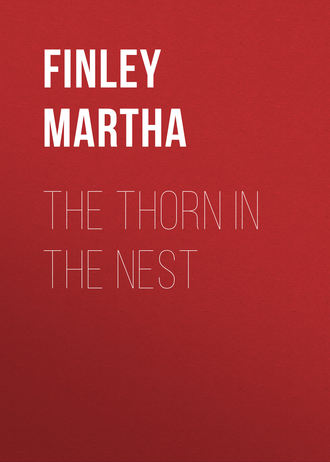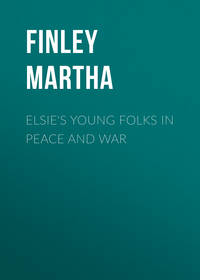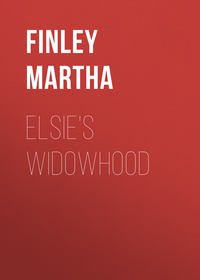 полная версия
полная версияThe Thorn in the Nest
"Well, now, that may be," the man returned thoughtfully. "Fact is, I've never paid much attention to those things. Minister, are ye?"
"No; a doctor."
"Find much to do about here?"
"Not just now," Kenneth answered aloud, adding to himself, "Happily I can very well be spared for a few days."
Upon the departure of the backwoodsman from the office, Zeb was summoned and directed to saddle Romeo and have him at the door by the time his master should return from a round of visits among his town patients.
"I am going off on a hunt, Zeb, and shall want my gun, blanket and some provisions; get me some parched corn, bread and a little salt, and pack them in one end of my saddle-bags," was his final order.
"Yes, sah. You'll take me 'long, I s'pose?" interrogatively.
"No, Zeb, I'm going alone; I must leave you to take care of the office and see who calls. I shall be away for two or three days, or longer, and shall want to know when I return who have been wanting the doctor, that I may go to them at once."
"'Tain't jes' the very bestest time ob yeah for a hunt," muttered the boy, watching his master as he strode rapidly down the street. "Wondah what sort ob game Massa Doctah's gwine arter."
By noon of that day Kenneth had put several miles of hill and valley between him and Chillicothe.
He had gone, telling no one whither, or on what errand he was bound, and those who saw him leaving the town took it for granted that he had had a call to some sick person in the country.
His course was northwesterly, and for days he pressed on sturdily in that direction, taking an hour's rest at noon, subsisting on the provisions in his saddle-bags, and such small game as came in his way, at night kindling a fire to keep off the wild beasts, and sleeping on the ground, wrapped in his blanket, with his horse picketed near by.
His way lay through pathless forests and over trackless prairies where perhaps the foot of white man had never trod; the solitude was utter and the compass his only guide; not a human creature did he meet; but during the hours of darkness his ears were greeted with the cry of the panther and the howl of the wolf, now far in the distance, now close at hand.
But brave by nature and strong in faith, Kenneth committed himself to the care of Him who neither slumbers nor sleeps, and there in the wilderness rested as securely in the shadow of His wing, as though in the midst of civilization and compassed by walls and bulwarks.
But in regard to the success or failure of the object of his journey he was not equally calm and trustful. How is it that our faith is apt to be so weak in respect to our Father's loving control of those things which affect our happiness in this life, even when we trust to Him unhesitatingly the far greater interests of eternity? Ah how slow we are to believe that word, "We know that all things work together for good to them that love God."
Such was Kenneth's experience at this time, earnestly striving, yet with but partial success, to throw off the burden of care and anxiety that oppressed him, now urging his steed forward with almost feverish haste, himself half panting with eagerness and excitement, and anon bringing it to a walk, while with head drooping and heavy sighs bursting from his bosom he seemed half inclined to turn and retrace his steps.
This hesitation, this shirking from the result of his quest, grew upon him as he advanced; but at length, "What weakness is this?" he cried aloud. "God helping me, I will throw it off and meet this crisis with Christian courage. Should the very worst come, it cannot peril that which I have committed to His hand. Blessed be His holy name for that gracious word, 'I give unto them eternal life: and they shall never perish, neither shall any pluck them out of my hand.'"
With the last words his voice rang out triumphantly on the silent air. Romeo pricked up his ears at the sound and quickened his pace to a rapid canter.
"Right, my brave fellow!" said his master, patting his neck; "on now with spirit, we are not far from the end of this long jaunt."
They were crossing a prairie, a sea of waving grass bespangled with flowers of many and gorgeous hues, beyond which lay a thick wood.
It was afternoon of the third day and the sun near its setting, as they plunged into the wood. Here the light had already grown dim, and soon darkness compelled a halt.
Kenneth dismounted, secured his horse in the usual way, gathered dry branches and leaves, and with the aid of flint and steel had presently a bright fire blazing.
A couple of birds which he had shot during the day, hung at his saddle bow. These he quickly stripped of their feathers and prepared for cooking, which he managed by suspending them before the fire, each on the end of a pointed stick whose other end was thrust well into the ground.
A bit of corn-bread from his saddle-bags, and water from a running stream near by, filled up the complement of viands that formed his simple repast.
He had but just begun it when a slight sound like the crackling of a dry twig, near at hand, made him look up.
The flickering firelight showed him a tall dark form creeping stealthily toward him, another and much smaller one close at its heels.
He instinctively put out his hand for his gun, lying by his side, then drew it back as he perceived that the approaching strangers were a woman and child. The former was wrapped in an Indian blanket, and carried a papoose on her back.
"Me friend," she said in broken English. "Me hungry; papoose hungry," pointing to the little one trotting at her side.
"Sit down and I will feed you," Kenneth answered, making room for her near the fire.
She seated herself upon the roots of a tree, the child crouching at her feet, laid the babe, which was sleeping soundly, across her lap, and taking the food he offered shared it with the other child.
Something in her look and manner half startled Kenneth. He hastily threw a pine knot upon the fire. It burst into a bright blaze, throwing a strong light upon the face and figure of the stranger, and Kenneth's heart throbbed as he looked keenly at her, at first beating high with hope, then almost it stood still in disappointment and despair.
"She is too young," he sighed to himself; then speaking aloud, "You are a white woman," he said.
"Squaw," she answered, shaking her head.
"You have grown up among the Indians and perhaps forgotten your own parents," he remarked, gazing earnestly upon her, "but your blood is white; you have not an Indian feature; your eyes are blue, your hair is red and curly."
She evidently but half comprehended what he was saying, gave him no answer save an enquiring bewildered look.
He called to his aid the slight knowledge he had gained of the Indian tongue, and at length succeeded in making himself understood.
At first she utterly denied that she belonged to the white race, repeating her assertion that she was a squaw, but finally admitted that he was right, acknowledging that she had a faint recollection of being carried away by the Indians in her very early childhood.
He asked if she would not like to go back; at which she answered very emphatically that she would not, she was the squaw of a young Indian brave, and the mother of these his children; loved husband and children dearly, and would on no account leave them.
She had strayed from her camp that day and lost her way in the woods, but would find it again and go back to the Indian village, distant not more than two or three miles, when the moon was up.
He ceased his persuasions, but regarded her with interest, thinking how sad it was that the child of civilized, perhaps Christian, parents should have become so entirely savage.
He asked if she knew of any other white woman among the Indians.
She did not.
He talked to her of God and of Christ, telling the sweet story of the cross, but was doubtful how much of it she was able to grasp.
She listened with a half interested, half puzzled air, a gleam of intelligence occasionally lighting up her somewhat stolid face.
But the silvery rays of the moon came stealing through the branches overhead, and, rousing the older child, who had fallen asleep on the ground at her feet, the woman arose, shouldered her still slumbering babe, and wrapping her blanket about her, gave Kenneth a farewell nod, and with the little one trotting at her heels as before, quickly disappeared amid the deep shadows of the wood.
The object of Kenneth's journey had been accomplished; the tiny flame of hope enkindled by the information gleaned from the hunter had gone out in darkness, and naught remained for him but to take up again his burden of secret grief and care, and go on with life's duties with what courage and patience he might.
Weary with the day's travel, he yet made no movement toward preparation for sleep. Long hours he sat over his fire in an attitude of deep despondency, hands clasped about his knees, head bowed upon his breast; then kneeling upon the ground he poured out his soul in prayer.
"Lord, the cross is very heavy, the cup very bitter, yet how light and sweet compared with what thou didst bear and drink for me! Forgive, oh, forgive the sin of thy servant! Who am I that I dare complain or murmur? Lord, hear the cry of thy servant! strengthen him that he rest in the Lord and wait patiently for Him; though it be till his feet stand upon the other shore."
CHAPTER VII
There was as yet no post-office in Chillicothe, and no regular mail. One came occasionally, brought by a man on horseback, and its arrival was always an event fraught with deep interest to most of the inhabitants.
This occurred during Kenneth's absence, for the first time in many weeks. There was a letter for him from Glen Forest, of which Dale took possession, paying the postage.
"When will your master be home?" he asked of Zeb, who was lounging before the office door.
"Dunno, sah; he didn't say, sah."
"Where did he go?"
"Dunno, sah; said he gwine on a hunt; wouldn't be home for two or three days."
"Two or three days! and he's been gone nearly a week," exclaimed Dale, stepping into his office. "Nearly a week," he went on thinking aloud, as he seated himself at his desk and laid the letter on it. "I wonder if we shouldn't turn out in a body and hunt for him; he may have met with an accident or – the treacherous savage!"
He frowned anxiously at the letter for a moment, then with sudden recollection turned from it to busy himself with his own correspondence. Several letters had come for him, and they must be read, digested, and answered. They absorbed his attention for some hours, then came the call to supper, and still Dr. Clendenin was missing.
Dale was growing very uneasy; Kenneth had become as a brother to him. "I must do something," he said to himself on his return to his office, taking up the letter again and gazing earnestly at it. "What can have become of him? Where can he have gone? If he isn't here within an hour, I shall go and consult the major.
"Ah!" he went on musingly, still gazing at the missive in his hand, "wouldn't he put spurs to his horse, if he knew this was here waiting for him, that is, if he's alive and free? How eager he always is for these letters, yet never opens one before anybody, never alludes to their contents.
"And they always seem to increase that mysterious trouble that he keeps so carefully to himself, and tries so hard to throw off, even when he and I are quite alone together."
But at that instant there was a sound of horse's hoofs in the street without, then a glad exclamation from Zeb, "Ki, massa doctah! thought the Injuns got you dis time, suah!" and, throwing down the letter, Dale rushed to the door to greet his friend.
Kenneth was in the act of dismounting, saying in a kindly tone to Zeb, as he gave him the reins, "No; here I am quite safe. Has there been any letter or message for me?"
"Yes; there was a mail to-day," Dale said, stepping forward and grasping his friend's hand with affectionate warmth. "A letter for you. Come in, I have it here. But," with a look of surprise and concern at the haggard face and drooping figure, "you are ill, my dear fellow!"
"Not at all, only somewhat weary and worn," Kenneth answered, with a faint smile that had neither mirth nor gladness in it. "But the letter, Godfrey! Is it from – "
"Glen Forest? Yes; the superscription, I noticed, is in the usual hand, post-mark the same as on the others. Here it is. Take this chair, and while you read I'll run over and tell Tiffin to see that they get a hot supper ready for you."
Putting the missive into Kenneth's eager, almost trembling, hand, he hurried away before the latter could utter a word of thanks.
For weeks Kenneth had been hungering for this letter, yet now that he held it in his hand he seemed to have need to gather up courage for its perusal. For a moment he sat with closed eyes, lips moving, though no sound came from them; then he broke the seal and read; at first eagerly, hastily, with bated breath, then, turning back to the beginning, with more care and deliberation, dwelling upon each sentence, while the shadow deepened on his brow, and again and again his broad breast heaved with a heavy sigh.
At length, at the sound of approaching footsteps, he rose and retreated to his own office, at the same time refolding the letter and putting it in his pocket.
Dale had delayed purposely on his errand, stopping to chat now with one, now with another, in the tavern, then in the street.
At his own door he was met by Major Lamar with the question, "Any news of the doctor yet?"
"Yes, he's just back; looking quite worn out, too."
"Ah! I'm sorry to hear that. I can see him, I suppose?"
"Oh, yes; walk right in. I left him – why, no, he isn't here! Sit down, major, and I'll hunt him up."
But here let us go back and tell of some occurrences of the previous day in the major's family.
Early in the afternoon Tig was standing with elbows on the fence and chin in hands, lazily watching the sports of the children as they vied with each other in the agility with which they could leap over stumps and logs, when Silvy's voice came sharply to his ears, "Tiglath Pileser, you lazy niggah, what you doin' dar? Didn't I tole you to clean de knives? Now Miss Nell is ready for to go ridin' and you just go right 'long and fotch de hosses roun' soon's eber you kin git dem saddled."
"Am I to go 'long, mother?" queried Tig, turning with alacrity to obey; for the horses were the pride of his heart, a ride with Miss Nell his greatest delight, especially when he was her sole companion and protector; and to-day he thought he should be, as he knew of no other escort.
His mother's reply confirmed his hopes. "Course you is; you always gets dat honor when dar ain't no gentleman 'bout."
Tig made haste to the stable, saddled and bridled Fairy and a pony belonging to the major with unaccustomed speed, and led them round to the front door, where Miss Nell was waiting in riding hat and habit.
"You were very quick this time, Tig," she said with an approving smile.
"Ki! Miss Nell," he answered, grinning from ear to ear, "no wondah; I'se in a big hurry, les' some dem gentlemen mout be comin' 'long 'fo' we gets off."
"What gentlemen, Tig?" she asked, laughing, as she stepped upon the horse-block and sprang lightly into the saddle.
"Oh, de doctah, or Mistah Dale, or some dem other gentlemen. 'Tain't often dis chile gets a chance to take care ob you, Miss Nell."
"Do you think you can take care of her, Tig?" asked Mrs. Lamar, coming to the door with a basket in her hand.
"Guess I kin, mistis, I ain't 'fraid no Injuns, nor b'ars, nor painters!" cried the boy, straightening himself with an air of injured dignity.
"Don't boast, Tig, till your courage has been put to the test," answered his mistress. "Here, take this basket and see if you can get it full of ripe mulberries for tea. Nell, I really don't feel quite sure that I ought to let you go without a better protector."
"Nonsense, Clare! I've done it before," returned the young girl, her color rising. "And the responsibility is not yours, I'm old enough to decide such matters for myself." And with that she touched Fairy lightly with the whip and cantered off, Tig following close in her rear. It was a lovely summer afternoon, the heat of the sun tempered by a cool, refreshing breeze. Fairy had scarcely been out of the stable for a day or two and was full of spirit, and Nell reveled in the delight of dashing away at almost headlong speed through the forest and over the prairies.
So enjoyable did she find the swift movement, with the sense of wild freedom it gave her, the beauty of the landscape, the sweet scent of the woods and wild flowers, that she went much farther than she had at first intended, or, indeed, was aware of.
Then coming back she stopped with Tig under a cluster of mulberry trees on the edge of a prairie, to fill the basket with fruit.
Not caring to stain her pretty fingers, she left the boy to fulfil the task alone, while she wandered to and fro, gathering flowers.
The sun was getting low as they remounted.
"We must hurry, Tig," Nell said, glancing uneasily toward the west. "I did not think we had been here so long."
They sped across the prairie and entered the wood that lay between it and the town. Here it was already dusk, and Nell urged Fairy on, her heart beating fast, while she glanced hither and thither, seeming to see an Indian, a bear, wolf, or panther behind every tree.
Suddenly she caught sight of a pair of fiery eyes glaring upon her from an overhanging branch, and the next instant, with a low, fierce growl, something leaped upon the back of her horse, a huge paw was laid on her shoulder, a hot breath fanned her cheek, while a wild shriek from Tig rang in her ears, and Fairy reared and snorted with fear.
Oh, the mortal terror that seized upon Nell, almost freezing the blood in her veins! Closing her eyes she leant forward and threw her arms about the neck of her pony, clinging to it in frantic terror for what seemed an age of suffering, but was in reality scarcely a moment.
A bullet, sped by an unerring hand, struck the panther in the eye, and it fell to the ground dead.
A horseman, hurrying from the direction of the town, put spurs to his steed at sound of the report of the gun, and almost before its echoes had died away, Nell was in her brother's arms.
He soothed and caressed her, she lying on his breast, sobbing and speechless with fright.
"Ugh! big fellow!" grunted a voice near at hand, and Nell, looking up, saw a tall Indian standing over the prostrate wild cat, the outline of whose form could be dimly discovered in the fading light.
"Wawillaway," said the major, holding out his hand to the chief, "you have saved my sister's life, and I can never fully return the obligation! Come with us to Chillicothe. My house shall be your home whenever you choose to make it so."
Wawillaway grasped the offered hand in one of his own, while with the other he held the bridle of Fairy, who was shying at the dead panther, and trembling and snorting with fear.
"Indian good gun," he said. "Indian go to white man's wigwam. Come, white squaw very much 'fraid."
"Yes, Nell, we had better go; for it grows darker every moment. Can you sit your horse now?"
"Yes," she whispered, "I must. But oh, Percy, keep close to me!"
"As close as I can. I will lead your horse," he answered, as he placed her in the saddle. "But where is Tig? I thought he was with you."
Tig had fled in overpowering terror, at the instant of the discharge of Wawillaway's gun, and on reaching home they found him there, telling an incoherent story of attacking Indians and wild cats, that filled the household with alarm.
Great was their relief at the sight of the major and his sister, though Nell was in a state of nervous prostration and excitement that made it necessary to put her at once to bed and watch by her during the night.
The next day she was but little better, and on her account her brother had been anxiously looking for Dr. Clendenin's return, and had now come in search of him.
Kenneth was not long in making his appearance. His manner was calm and quiet as usual, and shaking hands with the major, who expressed hearty satisfaction at seeing him again, he asked if the family were all well.
"All but Nell," was the reply, "and I don't know that there's much amiss with her. But I should like you to see her. She had a terrible fright yesterday, and doesn't seem to get over it."
Kenneth's look was anxious and inquiring.
"I supposed you had heard – " the major began, but Dale interrupted, "No, no, he hasn't had time to hear anything yet, or even to eat; and here comes Zeb with his supper. I told him to bring it over to your office, doctor."
"Thank you," said Kenneth, "but it can wait. I will go with you at once, major."
But the major would not hear of it.
"There is no hurry," he insisted. "Besides you ought to hear the story of her fright before seeing her, and may as well do so while breaking your fast."
Kenneth yielded, for he had not tasted food since early morning, and felt in sore need of it.
"What can we do for her?" asked the major in conclusion.
"Divert her mind from the subject as much as possible," returned the doctor. "Dosing is not what she needs."
"My opinion exactly," responded the major, "but I must crave your assistance in applying your prescription."
"Certainly, my dear sir, I will do my best."
It was a fair summer evening, the sun just touching the treetops, as Kenneth left his office in company with the major.
People were gathered about the doors of their dwellings or places of business, the day's work done for most of the men, though the busy housewives still plied the needle, sewing or knitting; thus exemplifying the truth of the old adage, "Man's work is from sun to sun, but a woman's work is never done."
Children played hide and seek among the trees, their glad voices ringing out upon the quiet air in merry shouts and silvery laughter; but many of them, on catching sight of Kenneth, left their sport to run and take him by the hand, welcoming him with eager delight, and asking him where he had been so long.
Older people, too, crowded about him with a like greeting and the same question.
He parried it as best he might, not feeling disposed to be communicative on the subject, returned the handshakings and kindly greetings, and asked after the health of each family represented.
"You have won all hearts here, Dr. Clendenin," the major remarked, when at length they had parted with the last of the friendly interrogators and were drawing near his own door.
"Oh, I believe it is so!" Kenneth answered, with a glad lighting up of his grave, almost sad face, "and I sometimes wonder how it has come about."
"Love begets love, and so it is with disinterested kindness also," the major answered.
Mrs. Lamar, coming to meet them, caught the last words. "Quite true," she assented, holding out a hand to Kenneth, "and I know of no one else in whose case we see such an exemplification of that fact as in Dr. Clendenin's. Doctor, running away so suddenly and mysteriously, you left many an anxious heart behind you."
She gave him a look of keen curiosity as she spoke. But he would not take the hint.
"My friends are very kind and I would not willingly cause them a moment's uneasiness," was all he said. It was gently spoken, but tone and manner did not invite a further display of inquisitiveness.
Nell, seated in the doorway in a listless attitude, rose suddenly on perceiving her brother's approach and who was with him, and, overcome by an unaccountable fit of shyness, hastily retreated into the house, her heart beating fast, the hot blood dyeing her cheek.
Then, much vexed with herself, she turned at the sound of Kenneth's voice saying "Good evening," and gave him her hand with a murmured "How do you do, doctor?"
He made her sit down, and drew up a chair for himself close to her side.
"Don't be afraid of me because I come in my professional capacity," he said in a playful tone, again taking her hand and laying a finger on her pulse.
"You needn't," she said with a little pout, and seeming half inclined to jerk the hand away. "I'm not sick. I wonder what nonsense Percy's been telling you."









